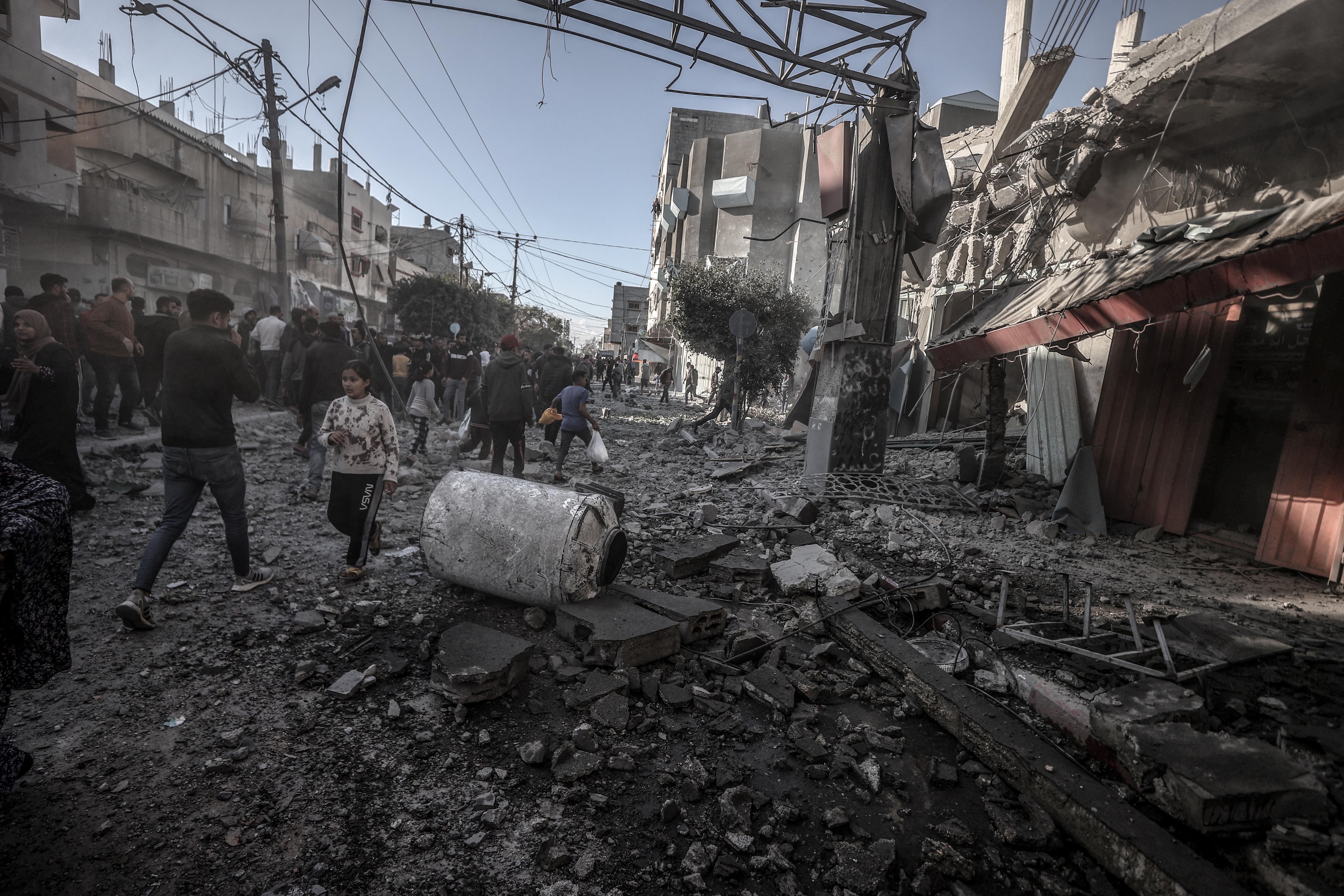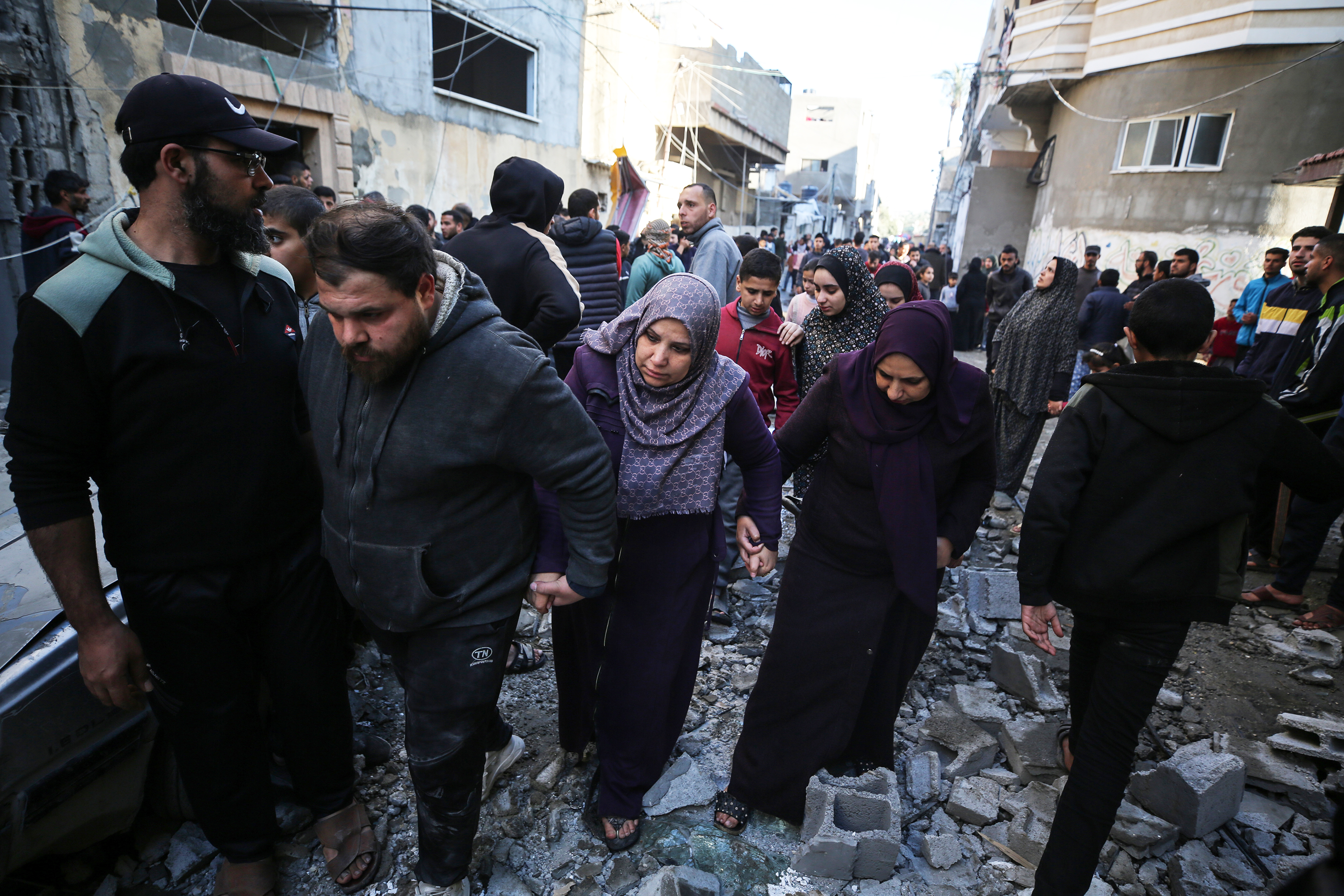Death toll from Israeli airstrikes in central Gaza rises to at least 68, hospital tells CNN

Buildings and roads are destroyed after an Israeli attack in Deir al-Balah, Gaza, on February 17
The death toll from airstrikes that hit central Gaza on Saturday has risen to at least 68, Al-Aqsa Martyrs Hospital told CNN Sunday. A doctor from the hospital had previously told CNN Saturday that 44 Palestinians were killed and dozens more were injured in the strikes that hit multiple neighborhoods in Deir al-Balah.
Video obtained by CNN from Al-Aqsa shows injured children among those being rushed in for treatment, as well as dead bodies, including a deceased baby, wrapped in cloth on the hospital floor. Israel said Saturday it successfully struck Hamas targets in the Nuseirat and Deir al-Balah neighborhoods.
On Saturday, the UN said Palestinians living in the southern city of Rafah were reportedly fleeing towards Deir al-Balah ahead of an anticipated Israeli ground invasion.

Mission accomplished...
Gaza's largest remaining functioning medical facility is out of service after Israeli raid, WHO says
The Nasser Hospital in Gaza is no longer functioning after a raid by Israeli special forces, the World Health Organization said. WHO teams were not permitted to enter the hospital in southern Gaza on Friday or Saturday "to assess the conditions of the patients and critical medical needs," WHO Director-General Tedros Adhanom Ghebreyesus said in the statement posted on X, adding scores of patients remain inside.
"There are still about 200 patients in the hospital. At least 20 need to be urgently referred to other hospitals to receive health care; medical referral is every patient’s right," he continued. "The cost of delays will be paid by patients’ lives," Tedros added, before urging that access to the patients and hospital should be facilitated for WHO staff.
Nasser Hospital was previously the largest remaining functioning medical facility in the Gaza Strip. The Israeli military claims they have credible evidence that Hamas had previously held hostages at the hospital, and that the bodies of deceased hostages may be at the hospital. However, it has not publicly released that evidence. CNN has reached out to the Israeli military regarding Tedros' claims.
Nasser Hospital has experienced critical shortages of fuel, oxygen and medical supplies. Before the Israeli military's raid on it on Thursday, hundreds of civilians were forced by Israeli forces to leave the hospital, which they had been using as a shelter.
About 70 health care workers arrested in Israeli raid on Nasser Hospital, Gaza's health ministry says
Israeli forces have put Nasser Medical Complex "completely out of service" and rendered it unable to handle critical cases, the Hamas-controlled Gaza Ministry of Health said Sunday. The comments back up a similar claim from the World Health Organization, which said its teams were not permitted to enter on Friday or Saturday.
Ministry spokesperson Dr. Ashraf Al-Qidra claimed around 70 health care workers were arrested by Israeli forces and 80 patients have been transferred out of the hospital to an unknown location.
Only 25 medical staff remain in the medical complex, and they are unable to handle cases requiring critical care, Al-Qidra said. For three days, electricity has been cut off to the complex, halting the supply of oxygen and water, Al-Qidra said. So far, seven people have died as a result, he said.
Israeli government formally rejects "international dictates" regarding a permanent settlement with Palestinians
The Israeli government on Sunday unanimously backed a decision to reject "international dictates" regarding a permanent settlement with the Palestinians. Israeli Prime Minister Benjamin Netanyahu said at the beginning of a cabinet meeting that he would ask for a formal vote "in light of remarks that have been heard recently in the international community about an attempt to unilaterally force a Palestinian state on Israel."
"Israel outright rejects international dictates regarding a permanent settlement with the Palestinians," his office said in a statement, adding that any settlement would be reached "solely through direct negotiations between the parties, without preconditions."
Tension builds: Netanyahu told CNN earlier this month that he is "certainly willing" to let the Palestinians “have all the powers that they need to govern themselves, but none of the powers that can threaten us." The issue of a Palestinian state has caused a rift between Israel and its closest ally, the United States, as US President Joe Biden continues to press for a two-state solution. The UK has also said it would consider recognizing a Palestinian state, with the United Nations calling the opposition to one "unacceptable."
The West Bank situation is a "real obstacle" to a two-state solution, top EU diplomat says
The European Union's top diplomat says the situation in the Israeli-occupied West Bank is a "real obstacle" for a two-state solution to the Israeli-Palestinian conflict, adding that peace in the Middle East cannot be achieved without a clear prospect for the Palestinian people.
Speaking at the Munich Security Conference, Josep Borrell said the level of violence against Palestinians in the West Bank has increased since the Hamas attacks on October 7 and has not been discussed enough. "Everybody talks about ending the war in Gaza. Yes, we have to end the war in Gaza. But nobody has talked a lot about the West Bank," he said, stressing that "the West Bank is boiling."
Borrell added that he believes there is space for Europe to support a two-state solution, but for that, he said, Europe needs to be more united and must have the US "more than on board."
Key context: Under the Oslo Accords peace agreement of the 1990s, the plan was for Israel to gradually hand over control over more and more of the West Bank, but that has never happened. Israel has full administrative and security control over 60% of the area.
More than 700,000 Jewish settlers now live in the West Bank and East Jerusalem, land on which the Palestinians, along with the international community, want to establish a future Palestinian state. The settlements are considered illegal under international law and are widely seen as one of the main obstacles to a two-state solution. While the areas where settlements encroach on Palestinian land have always been prone to violence, settler attacks on Palestinians have spiraled out of control in recent months.
It's now 30 years since the Oslo Accords (1993). For 30 years the UN and international community have failed to enforce the accords and Israel has only taken more land. Only 18% of the West Bank is under control of the PA, which in itself is a tool of Israel. The other 22% are shared control with Israel.
Netanyahu derailed the process in 1996 in his first term, there won't be any progress as long as he's back in power.




















